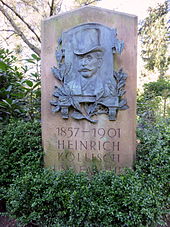Hein Köllisch
Hein Köllisch (born September 19, 1857 in Hamburg , † April 18, 1901 in Rome ; real name Heinrich Köllisch) was a Low German humorist and songwriter .
Life
He grew up at Pauls-Platz, later Hein-Köllisch-Platz , in St. Pauli . Originally, he was supposed to follow in the footsteps of his father, who was a shoemaker from Augsburg and became famous for his self-made shoe wax from the bottle.
Instead, he learned the locksmith and went after his apprenticeship as a journeyman through southern Germany and Switzerland while traveling. After his father's death, however, he returned to Hamburg and continued to run the factory.
Around 1890 Köllisch married Marie Meyer, the daughter of a royal music master, with whom he had five children: Jonny, Ludolf, Minna, Heinz and Maria. The family lived on a terrace between Bartelsstrasse and scapula .
In 1901 Hein Köllisch went on a vacation trip to Italy, where he fell ill with pneumonia in Rome. When his wife Marie gave him a bouquet of lilacs on his deathbed, he is said to have said: "Hamborger Pingsten". Hein Köllisch died on April 18, 1901 at the age of 43 in Rome. When it was transferred to Hamburg, thousands of Hamburg residents are said to have lined the streets through which the funeral procession to Ohlsdorf cemetery moved. A chronicler reported that the trams had to be diverted. Hein Köllisch's audience is said to have shouted to the family: "He's not just yours, he's ours".
Hein Köllisch was buried in the Ohlsdorf cemetery in grid square Q6 / R6, 40-46 (above the Althamburg Memorial Cemetery ).
Stage career
Heinrich (Hein) Köllisch often performed simple, Low German songs and weird couplets at his regulars' table in a corner pub on Bartelsstrasse . One day the owner of an amusement park in St. Pauli noticed him, who made him appear as a Low German humorist. He got his first engagement on May 1st, 1892 in “Im Seventh Heaven” on Spielbudenplatz , where he performed for 300 marks a month. At that time a dock worker received 3 marks a day for 15 hours of work.
At that time the Spielbudenplatz was Hamburg's theater and variety mile. For example, the Carl-Schultze-Theater was located there , in which Low German comedies were played. The Ernst-Drucker-Theater (today St. Pauli-Theater ), directed by Ernst Drucker from 1884 to 1918, and today's Operettenhaus Hamburg also served this genre.
Two years after his first engagement in 1894, Köllisch then opened his own theater on Spielbudenplatz. In "Hein Köllischs Universum", later also called "Köllischs Lachbühne", he was always on stage in tails and top hats. “The best suit is just good enough for my mother tongue,” Hein Köllisch is supposed to have said. He wrote the lyrics for his songs himself and set them to music with popular Viennese melodies. He also wrote Low German parodies and plays. His more than 100 couplets included songs such as De Orgel kummt , De Reis no Helgoland and, above all, De Pingsttour . There are supposed to be original recordings of him in the form of Edison cylinders , but they have been lost.
Works (selection)
- The organ struggles
- De Reis no Helgoland
- De Pingsttour
- De Bruunkoken
- De Loreley
- Kinners, this is disgusting
- All sorts of sooks
- Hamborger Döntjes
Web links
- Literature by and about Hein Köllisch in the catalog of the German National Library
- De Pingsttour
- Hamburg's unforgettable original. In: welt.de. April 18, 2001.
Individual evidence
- ↑ hamburg-bildarchiv (historical photo from 1902)
| personal data | |
|---|---|
| SURNAME | Köllisch, Hein |
| ALTERNATIVE NAMES | Köllisch, Heinrich (real name) |
| BRIEF DESCRIPTION | German songwriter, humorist and theater director |
| DATE OF BIRTH | September 19, 1857 |
| PLACE OF BIRTH | Hamburg |
| DATE OF DEATH | April 18, 1901 |
| Place of death | Hamburg |


